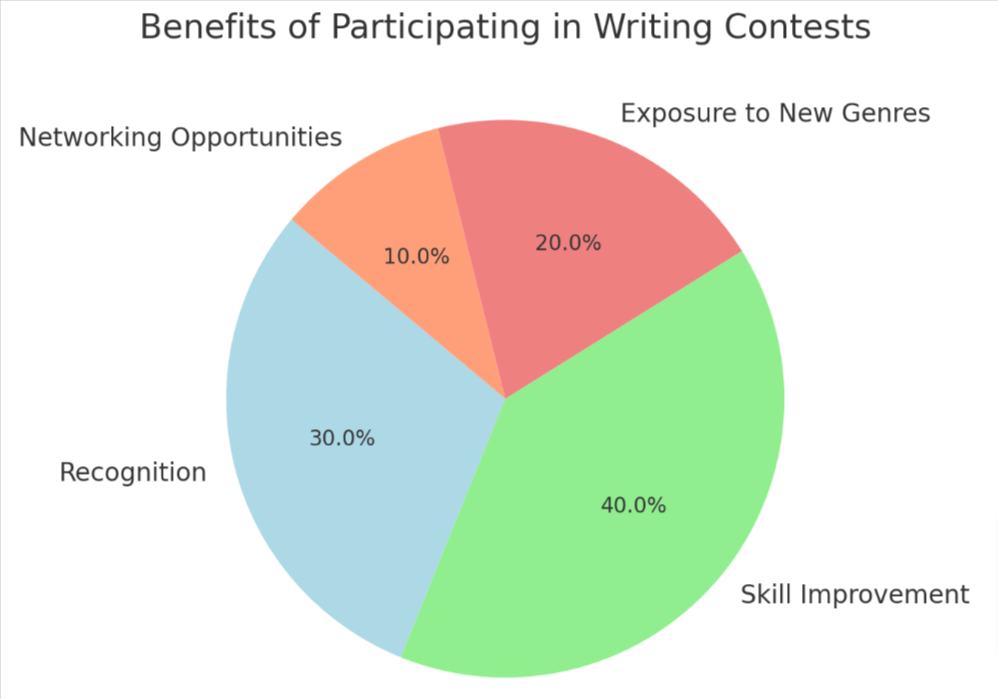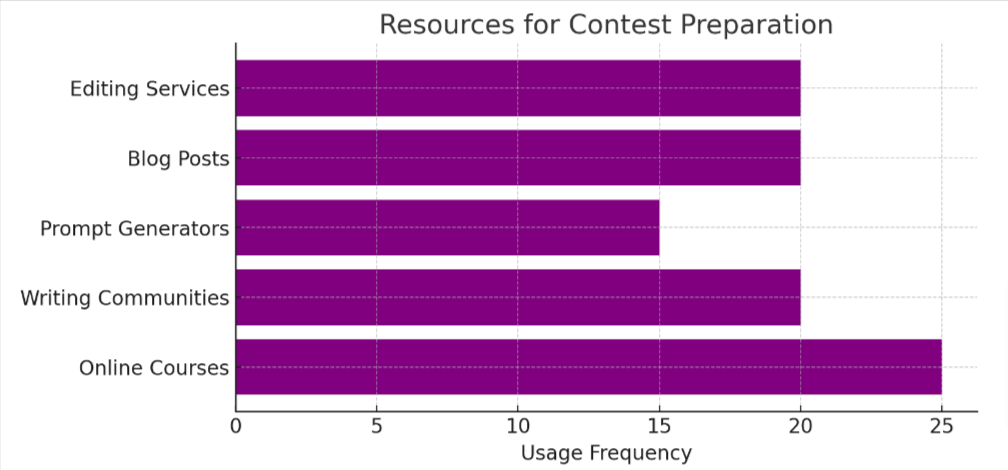Stepping Up Your Game: Thriving in Review Writing Competitions
Are you a writer looking to get your work noticed? Each year, thousands of writing contests offer the chance for recognition and prizes. In this post, we’ll guide you through the benefits of these competitions and share tips on how to come out on top.
Get ready to write your way to success!
Key Takeaways
- Writing contests and challenges can lead to recognition, publication, and exposure to new writing genres.
- To win writing contests, it’s critical to research the right competitions that match your style, follow all submission guidelines carefully, and revise your work thoroughly before entering.
- Free online courses, blog posts with writing advice, and various resources like writing prompts help writers prepare for contests by improving their skills.
- After entering a contest or challenge, gathering feedback from judges is valuable for understanding how to improve future submissions.
- Regular participation in different contests encourages ongoing improvement of writing skills and versatility as a writer.
Benefits of Participating in Writing Contests and Challenges
Participating in writing contests and challenges provides writers with the opportunity for recognition, publication, and exposure to new genres and themes. It also serves as motivation to improve one’s writing skills.
Opportunity for recognition and publication
Entering writing contests and challenges can shine a spotlight on your work. Winners often attract attention from publishers, literary agents, and a larger audience. Placing in these competitions not only adds credibility to your resume but may also give you the chance to see your name in print or online publications.
This kind of exposure is invaluable for emerging writers looking to establish themselves in the literary world.
Imagine having your story featured in an anthology or your poem published in a well-respected journal—these are common prizes offered by contest organizers. Not only does this bolster your portfolio, but it also paves the way for future opportunities such as book deals and paid writing gigs.
Your success stories could inspire others while setting up milestones in your creative journey.
Motivation to improve writing skills
Jumping into creative writing contests can be the spark you need to enhance your writing abilities. With each contest, writers are pushed to meet high standards and stand out among peers, driving them to polish their style and storytelling techniques.
The competitive spirit flourishes as participants strive not just for recognition, but also personal growth through crafted words.
Facing a panel of judges in a short story competition or tackling various themes in poetry contests serves as a powerful incentive. This pushes you to analyze your work critically, making every word count toward success.
As you refine sentences, develop characters, and tweak plots with each submission, inside knowledge grows – turning literary challenges into stepping stones that build up mighty writing skills over time.
Exposure to new genres and themes
Exploring uncharted territories in writing, contests and challenges often push participants out of their comfort zones. They introduce writers to genres they might not usually select or themes that are unfamiliar, sparking creativity and broadening perspectives.
This exploration can open doors to experimental prose, speculative fiction, or insightful poetry that reflects contemporary issues.
Diving into different literary forms sharpens a writer’s adaptability. It teaches how to weave narratives in multiple styles – from the succinct punch of short story competitions to the lyrical elegance required by poetry contests.
Engaging with new subject matter also enriches a writer’s toolkit, providing fresh ideas that could inspire future projects or even transform writing practices permanently.

Tips for Winning Writing Contests
Research and choose the right contests based on your strengths and interests. Follow guidelines and instructions carefully to ensure your submission meets all requirements. Edit and revise your work thoroughly before submitting to maximize your chances of success.
Research and choose the right contests
When selecting contests, be sure to consider the genre and theme that best aligns with your writing style. Evaluate the reputation of the contest organizers and judges to ensure credibility.
Examine entry requirements, such as word count and submission format, to avoid disqualification.
Prioritize contests that offer valuable feedback or exposure, increasing your chances of recognition. By tailoring your submissions to specific contests, you can significantly enhance your prospects of success within writing competitions.
Follow guidelines and instructions carefully
Carefully follow the guidelines and instructions for each writing contest or challenge. Adhering to these directives is crucial for ensuring that your submission meets the specific requirements set by the organizers.
Inconsistencies in following the guidelines could result in disqualification, so it’s important to pay close attention to details such as word count, theme, formatting, and submission deadlines for each competition.
Ensure meticulous adherence to the guidelines and instructions provided by the contests or challenges you enter. This will demonstrate your professionalism and respect for the competition’s rules, increasing your chances of being considered favorably by judges.

Edit and revise your work thoroughly
To ensure the quality of your writing competition submission, carefully edit and revise your work. Check for grammar and spelling errors, and refine sentence structure to make your piece coherent and polished.
Use tools like grammar checkers and proofreading software to identify mistakes, ensuring that your entry is in top form before submitting it.
After thoroughly reviewing your work, consider seeking feedback from fellow writers or professionals to gain valuable insights for improvement. This meticulous approach will enhance the overall quality of your submission, giving you a competitive edge in writing contests and challenges.
Resources to Help You Prepare for Writing Contests
Discover free online courses, blog posts, and writing advice to improve your skills, as well as bonus resources like writing prompts. To find out more about how these resources can help you succeed in writing contests and challenges, keep reading!
Free online courses
To improve your writing skills for contests and challenges, you can take advantage of free online courses. These courses offer valuable insights into various aspects of writing, including plot development, character building, and style. Here are some resources that can help you enhance your writing abilities:
- Explore online platforms such as Coursera or Udemy, which offer free creative writing courses covering different genres and techniques.
- Look for specialized workshops on platforms like Skillshare that focus on specific elements of storytelling, such as dialogue or world-building.
- Consider joining virtual writing communities where members share tips, feedback, and resources to support each other’s growth as writers.
- Utilize podcasts dedicated to writing advice or interviews with established authors to gain inspiration and learn from their experiences.
- Engage with online forums or social media groups focused on writing to participate in discussions and receive constructive criticism from peers.
Blog posts and writing advice
After taking advantage of free online courses, writers can further enhance their skills by reading various blog posts and seeking valuable writing advice. Here are some resources that can provide helpful insights and tips for improving your writing and increasing your chances of winning contests and challenges:
- Explore blogs dedicated to writing craft, which can offer detailed articles on plot development, character creation, and effective storytelling techniques.
- Engage with writing communities through social media platforms for valuable feedback, support, and advice from experienced authors.
- Read interviews with published authors on their writing processes, inspiration, and experiences in participating in writing contests and challenges.
- Follow reputable literary magazines or websites that provide regular updates on upcoming contests, submission guidelines, and tips for creating standout entries.
- Subscribe to newsletters or mailing lists of writing organizations or creative writing instructors that offer exclusive insights into the world of literary competitions.
Bonus resources such as writing prompts
After utilizing blog posts and writing advice, writers can enhance their creativity and hone their skills further with bonus resources such as writing prompts. These resources provide additional inspiration and guidance, assisting writers in overcoming writer’s block or exploring new ideas. Here are some bonus resources to consider:
- Writing Prompt Websites: Explore websites that offer daily, weekly, or themed writing prompts to spark creativity and help generate new story ideas.
- Writing Prompt Apps: Download writing prompt apps for convenient access to prompts on the go, enabling spontaneous and continuous writing practice.
- Writing Prompt Books: Invest in physical or digital books filled with various writing prompts tailored to different genres and styles to expand your creative repertoire.
- Writing Prompt Communities: Join online communities or forums where members share and discuss writing prompts, fostering a supportive environment for idea exchange and feedback.
- Writing Prompt Generators: Use online tools that randomly generate prompts based on specific criteria, allowing for customized challenges suited to individual interests.
After Submitting Your Work
After submitting your work to a writing contest or challenge, seek feedback from judges to gain insight into where you can improve. Consider hiring an editor for future submissions and continue honing your writing skills by participating in more contests.
Seek feedback from judges
After submitting your work to a writing contest or challenge, it is essential to seek feedback from the judges. Constructive criticism helps in understanding your strengths and areas for improvement.
Taking this feedback into account can aid in refining your writing skills for future submissions, increasing the likelihood of success in subsequent contests or challenges.
Receiving input from judges allows you to gain valuable insights into how your work is perceived by others within the literary community. This can be an invaluable learning experience that contributes to ongoing growth and development as a writer.
Consider hiring an editor for future submissions
After seeking feedback from judges, it’s advisable to consider hiring an editor for future submissions. An experienced editor can provide valuable insights, helping polish your work by refining grammar, structure, and coherence.
They offer a fresh perspective and identify blind spots in your writing that you might miss. With their expertise, you can ensure that your submissions are at their best before entering competitions or challenges, increasing the likelihood of success while enhancing your overall writing skills.
Continuing to develop as a writer is crucial to gaining recognition and excelling in contests and challenges. Professional editing assistance positions you for greater chances of standing out amidst tough competition.
Continue honing your writing skills and participating in contests.
Take advantage of the feedback you receive from judges to refine your writing skills. Seek out opportunities that allow for growth and improvement, such as workshops or online courses.
Expose yourself to different genres and styles of writing to expand your capabilities. Regularly practice by entering a variety of contests and challenges, allowing you to continually evolve as a writer.
Push yourself outside your comfort zone when participating in future contests. Experiment with new themes and subjects; this will help improve your versatility as a writer. Expanding the range of topics you tackle can give you an edge over others in future competitions.
Conclusion
In conclusion, writing contests and challenges offer numerous benefits such as the opportunity for recognition and publication. They also provide motivation to improve writing skills while exposing participants to new genres and themes.
By researching and selecting the right contests, following guidelines carefully, and thoroughly revising their work, writers can increase their chances of winning such competitions.
Additionally, they can utilize free online courses, blogs offering writing advice, and bonus resources like writing prompts to help them prepare for future contests. After submitting their work, seeking feedback from judges and considering hiring an editor for future submissions are crucial steps in a writer’s journey.
Finally, continuing to hone one’s writing skills through participation in various contests is important to achieve success in the field of creative writing.

